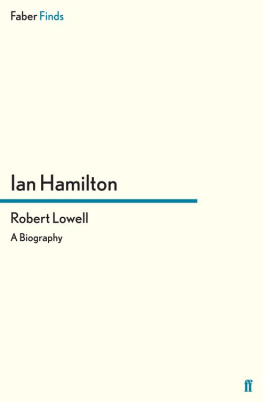Conversations with Stanley Kunitz
Literary Conversations Series
Peggy Whitman Prenshaw
General Editor
Conversations with Stanley Kunitz
Edited by Kent P. Ljungquist

www.upress.state.ms.us
The University Press of Mississippi is a member of the Association of American University
Presses.
Copyright 2013 by University Press of Mississippi
All rights reserved
Manufactured in the United States of America
First printing 2013

Library of Congress Cataloging-in-Publication Data
Kunitz, Stanley, 19052006.
Conversations with Stanley Kunitz / edited by Kent P. Ljungquist.
pages cm. (Literary Conversations Series)
Includes index.
ISBN 978-1-61703-870-9 (cloth : alk. paper) ISBN 978-1-61703-871-6 (ebook) 1. Kunitz, Stanley, 19052006Interviews. 2. Poets, American20th centuryInterviews. 3. PoetryAuthorship. I. Ljungquist, Kent, 1948 II. Title.
PS3521.U7Z46 2013
811.52dc23
[B] 2013013053
British Library Cataloging-in-Publication Data available
Books by Stanley Kunitz
Intellectual Things. New York: Doubleday, Doran, 1930.
Passport to the War: A Selection of Poems. New York: Holt, Rinehart, and Winston, 1944.
Selected Poems 19281958. Boston: Atlantic-Little Brown, 1958.
The Poems of John Keats, editor. New York: Crowell, 1965.
The Testing-Tree. Poems. Boston: Atlantic-Little Brown, 1971.
Akhmatova, Anna. Poems of Akhmatova. Translated, and introduced by Stanley Kunitz and Max Hayward. Boston: Atlantic-Little, Brown, 1973.
Vosnesensky, Andre. Story under Full Sail. Co-translator. New York: Doubleday, 1974.
The Terrible Threshold: Selected Poems 19401970. London: Secker & Warburg, 1974.
The Coat without a Seam: Sixty Poems 19301972. Northampton, MA: Gehenna Press, 1974.
A Kind of Order, A Kind of Folly: Essays and Conversations. Boston: Atlantic-Little, Brown, 1975.
Drach, Ivan. Orchard Lamps, editor and co-translator. New York: Sheep Meadow Press, 1978.
The Poems of Stanley Kunitz, 19281978. Boston: Atlantic-Little, Brown, 1979.
The Wellfleet Whale and Companion Poems. New York: Sheep Meadow Press, 1983.
Next-to-Last Things: New Poems and Essays. Boston: Atlantic-Little, Brown, 1985.
The Essential Blake, editor. New York: Ecco Press, 1987.
Passing Through: The Later Poems New and Selected. New York: W. W. Norton & Company, 1995.
Shapiro, Karl. The Wild Card: Selected Poems, Early and Late, editor with David Ignatow. Champaign: University of Illinois Press, 1998.
The Collected Poems. New York: W. W. Norton & Company, 2000.
The Wild Braid: A Poet Reflects on a Century in the Garden. With Genine Lentine. New York: W. W. Norton & Company, 2005.
Contents
Margaret Parsons / 1960
Allen Tate / 1966
Robert Russell / 1967
Richard Kostelanetz / 1969
Candace DeVries Olesen / 1972
Adele Slaughter / 1974
Cleopatra Mathis, Anne Cherner, and Elmaz Abinader / 1977
Alan Loxterman / 1977
Harvey Gross / 1978
An Interview with Stanley Kunitz
University of Virginia Alumni News /1980
Kathleen Weldon and Rose Slivka / 1981
Ayappa Paniker / 1982
Madeleine Beckman / 1982
Peter Stitt / 1990
Leslie Kelen / 1991
Christopher Busa / 1992
Donald G. Parker and Joan I. Siegel / 1993
Gary Pacernick / 1995
Mark Wunderlich / 1997
Jason Shinder / 2000
Introduction
Stanley Kunitz, the public voice for poetry, certainly became more widely known to a general audience via a conversation with Bill Moyers, Dancing at the Edge of the Road, part of a series on the Public Broadcasting System in 1989. The title of Moyerss program was drawn from Kunitzs An Old Cracked Tune, a poem that had come to occupy a significant place in his readings in the later decades of his career. The figure in the poem is Solomon Levi, a name that was taken from an offensive street song, but Kunitz sees him as an outcast, a marginalized outsider who somehow transcends his status. In short, he is a stand-in figure for the poet. The interview was later republished in two books, one edited by Moyers and the other by Stanley Moss. Kunitz spoke with such authority and penetrating insight in this interview about the powerful role of poetry that some viewers and readers may have assumed that the confidence he exuded derived from an uninterrupted pattern of public recognition and appreciation that extended back to the beginning of his literary career. As this collection of interviews shows, however, the trajectory of Kunitzs poetic career is hardly a smooth pathway at every turn from early experimentation to quick acceptance and recognition.
Although his early volumes Intellectual Things (1930) and Passport to the War (1944) won positive reviews from critics, his poems, even in the decades after World War II, were seldom anthologized. Kunitzs career is unique for several reasons, not the least of which is its expansive connection to several generations of American poets. He began by contributing to periodicals like the Dial and Poetry in the 1920s when many of the features of high modernism were coming into vogue. In several interviews, Kunitz points out that this was a period of personal and professional isolation. There were no creative writing programs at the time, no poetry readings, and the lack of a sense of artistic community was a condition he bore stoically. There were no public readings of his own poetry even up to the middle years of his writing career, and a sense of exile or metaphysical loneliness was an emotional condition with which he was all too familiar.
That sense of personal isolation stemmed, to be sure, from childhood memories of growing up in his hometown of Worcester, Massachusetts. As he notes in one interview, Memory is each mans poet in residence, and the vulnerability of [his] own youth echoes throughout the body of his poetic work and his related comments on his verse. Very much a poet of root images, he recalls the central event of his family life that would hover like a shadow over his childhood and adolescence and assume a lasting impact: his fathers suicide six weeks before he was born. His mothers response was to erase all memories of his fathers life and the circumstances of his death, but the emotional struggles Kunitz faced in the aftermath of the suicide led him to transform his fatherhis name is never mentioned outright in the poemsinto a mysterious, even mythical figure. This tortuous path of questioning, discovery, and uncovering of personal and family secrets eventually led him to signature themes in his work: the quest for identity and the search for a paternal figure.
There were stirrings to become a writer, he notes, as early as age thirteen or fourteen, and he even began nave experimentation with adventure stories. The desire to probe inward was probably accentuated by his hostile reaction to aspects of his native setting. Worcester was a city of immigrants, whose seven hills might, the town officers suggested, recall Rome; in Kunitzs mind, however, each hill constituted a separate enclave inhabited by a discrete ethnic group (Irish, Swedes, Poles, Armenians, Italians, and eastern European and Russian Jews), each of which turned inward toward to its own insular traditions rather than outward to a broader world. Long before Kunitz achieved any degree of national notoriety, one of his earliest interviews was with the local Worcester newspaperfor which he had worked after graduating from college. The interview led to a brief exchange about another writer who chronicled memories of experiences from roughly the same local neighborhood.
Next page






